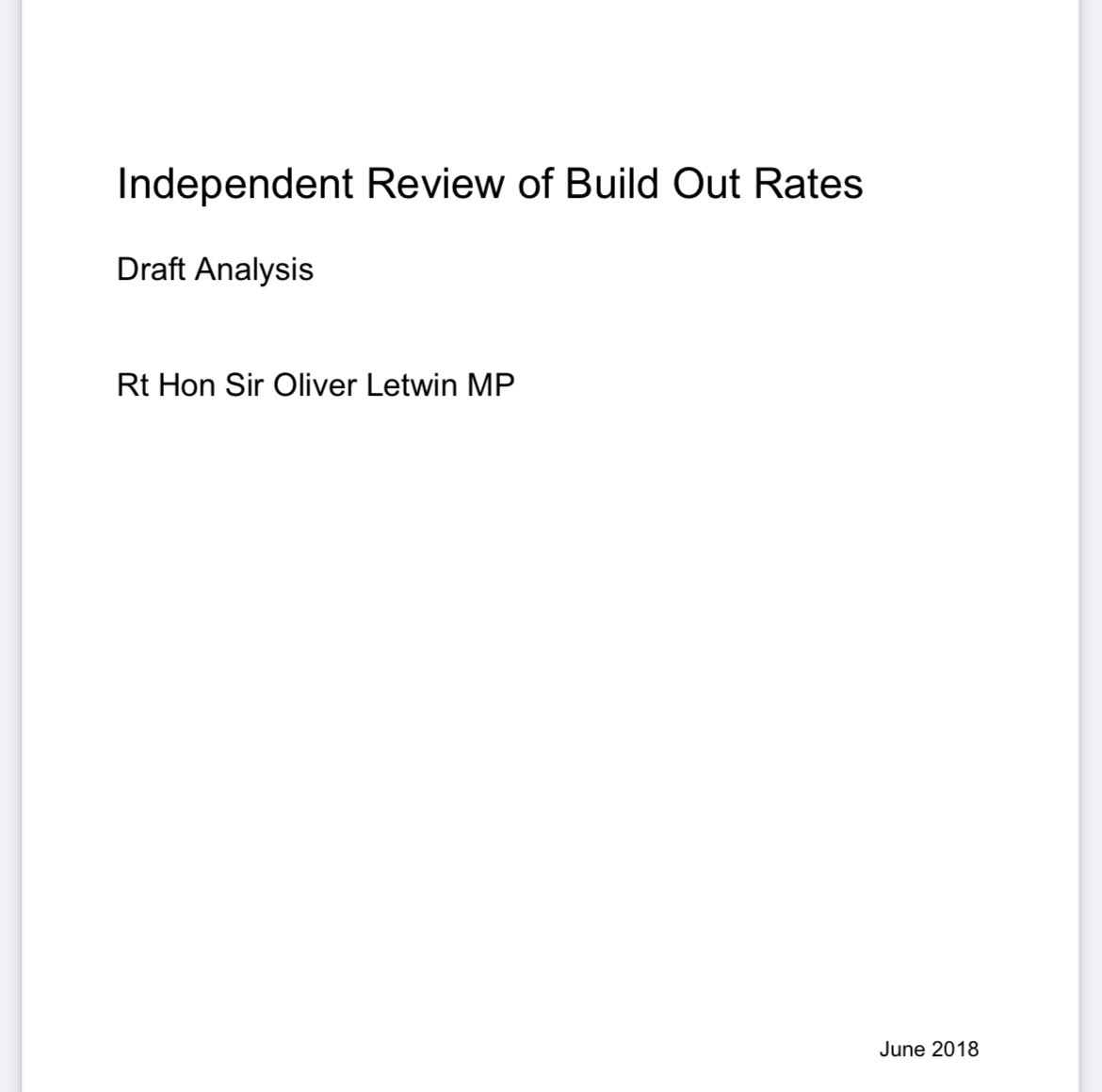Neglected fact: getting more housebuilding is about more than planning reform.
Here’s an important graph for understanding that:
Developers have consistently under-delivered on their planning permissions for years.
🧵 on why and why it matters
Here’s an important graph for understanding that:
Developers have consistently under-delivered on their planning permissions for years.
🧵 on why and why it matters

As mentioned, this phenomenon - builders with consents not building - is not new, it’s been the case for ages.
Flummoxed by it, in 2018 the Conservative government commissioned Oliver Letwin to figure out what was going on.
What he found was startling.
assets.publishing.service.gov.uk/media/5b2d1ab2…

Flummoxed by it, in 2018 the Conservative government commissioned Oliver Letwin to figure out what was going on.
What he found was startling.
assets.publishing.service.gov.uk/media/5b2d1ab2…

Letwin found on large sites, developers were *intentionally building out slowly in order to keep the price of housing high in that area*.
This is what’s meant by ‘the absorption rate’, an industry euphemism.
The largest sites can take 15 years (15!) to complete for this reason


This is what’s meant by ‘the absorption rate’, an industry euphemism.
The largest sites can take 15 years (15!) to complete for this reason


Developers don’t do this because they’re evil, they do it because it’s rational.
They have paid top dollar for land, and planned profits, on the basis of selling their homes at the current price - not lower.
Letwin again:
They have paid top dollar for land, and planned profits, on the basis of selling their homes at the current price - not lower.
Letwin again:

Because there’s only a handful of big builders - and we need more big sites, there’s a housing shortage and LAs have targets to meet - they get away with acting like a cartel.
Keeping the site ‘viable’ post-land purchase often compels slower building or no building at all.
Keeping the site ‘viable’ post-land purchase often compels slower building or no building at all.
Incidentally this also explains many other maladies: it’s why developers cut corners on quality, on infrastructure & affordable housing.
The developer with the best deal for the landowner is de facto the one with the worst deal for consumers.
Is it surprising we get NIMBYs?
The developer with the best deal for the landowner is de facto the one with the worst deal for consumers.
Is it surprising we get NIMBYs?
How to fix this? Letwin and other work points to:
State-backed development corporations with the power to buy up land cheaply (via CPO if needed) and ‘parcel it out’ at lower cost to a wider range of builders - with obligations on cost, build out speed and quality.
State-backed development corporations with the power to buy up land cheaply (via CPO if needed) and ‘parcel it out’ at lower cost to a wider range of builders - with obligations on cost, build out speed and quality.
Because the state would own the land, they don’t have to prioritise maximum short-term returns - they can lower development costs for builders and thus deliver more homes & better homes.
The landowner loses (tho they still get pretty rich !) but everyone else wins.
The landowner loses (tho they still get pretty rich !) but everyone else wins.
This though requires more active and imaginative statecraft than “more permissions” (YIMBY/Treasury default) or “bung Housing Associations more money for social housing” (NGO default).
It was normal in the post-war era, but lost amid the hollowing out of state in Thatcher era.
It was normal in the post-war era, but lost amid the hollowing out of state in Thatcher era.
That said, funding more affordable rented housing can help with build out rates too, since rents for these products are fixed and demand for them is essentially limitless (see the homelessness figures…).
A more libertarian solution also exists tbf: you undermine landowner bargaining power vs developers by basically abolishing the planning system.
But - aside from the politics - I don’t get why it works when land itself, esp in areas ppl want to live in, will always be finite.
But - aside from the politics - I don’t get why it works when land itself, esp in areas ppl want to live in, will always be finite.
Anyway, that is the thread.
My general plea is that endless rounds of planning reform - just giving big developers more of what they want (consents) - has not moved the dial for a reason.
The problem is more complex and discussion around it should better reflect that.
My general plea is that endless rounds of planning reform - just giving big developers more of what they want (consents) - has not moved the dial for a reason.
The problem is more complex and discussion around it should better reflect that.
• • •
Missing some Tweet in this thread? You can try to
force a refresh














